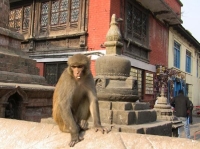Inhalation of smoke, dust or polluted air, excess exercise, suppression of natural urges, and overuse of dry foods can produce cough or respiratory irritation. Neglect of cough can lead to more serious lung conditions.
Kasa (Cough / Bronchitis)
 Kasa refers to coughs, and are caused by irritation of the respiratory system. Cough can be a symptom of any number of diseases, but in the form of bronchitis it is classified into five categories: Vata, Pitta, Kapha, Kshayaja and Kshataja. If not treated properly, bronchitis can become a chronic disease that is very difficult to cure, regardless of the cause. Chronic bronchitis has to be treated with both rasayanas (restoratives) and the specific medicines for bronchitis, including:
Kasa refers to coughs, and are caused by irritation of the respiratory system. Cough can be a symptom of any number of diseases, but in the form of bronchitis it is classified into five categories: Vata, Pitta, Kapha, Kshayaja and Kshataja. If not treated properly, bronchitis can become a chronic disease that is very difficult to cure, regardless of the cause. Chronic bronchitis has to be treated with both rasayanas (restoratives) and the specific medicines for bronchitis, including:
- Duralambha bush (Fragonia cretica)
- Karkatashringi fruit gall (Pistacia intergerrima / Insect gall)
- Kantakari herb (Black nightshade / Solanum xanthocarpum)
- Punarnava plant/root (Boerhavia difusa)
- Tamalaki herb (Phyllanthus niruni)
- Pippali fruit (long pepper / Piper longum)
- Haritaki fruit (Terminalia chebula)
- Amalaki fruit (Indian gooseberry / Phyllanthus emblica)
Some useful formula against cough/bronchitis include are:
- Chaturdasanga churna, 2 grams taken with honey if the cough is with mucus or salty water if the cough is dry. In serious cases this remedy is combined with the Rasasindura (red crystal of mercury sulphide).
- Sringarabhraka compound, 500 mg taken with honey or meat soup.
- To stop irritation in the throat, the patient is given Sambhukadi vati as a lozenge.
Vataja Bronchitis
Bronchitis with the character of Vata is concerned with the aggravated function of the bronchial nervous system, manifesting as a dry cough. It is treated with the standard Vata treatments and diet along with the specific remedies against bronchitis.
Pittaja Bronchitis
Bronchitis with the character of Pitta is concerned with the aggravated function of the bronchial vein system, with symptoms of cough with heat and inflammation. It is treated with the standard Pitta treatments and diet along with the specific remedies against bronchitis.
Kaphaja Bronchitis
Bronchitis with the character of Kapha is concerned with the aggravated bronchial artery system, with cough, swelling and mucus. It is treated with the standard Kapha treatments and diet along with specific remedies against bronchitis.
Kshayaja Bronchitis
Bronchitis with the character of Kshayaja is related to tuberculosis. It is treated with the same the remedies of pulmonary TB along with the specific remedies against bronchitis.
Kshataja Bronchitis
Bronchitis with the character of Kshataja involves lesions in the lungs. It is difficult to cure. It is treated with the remedies for TB, rasayanas, anti-hemorrhagic remedies and the remedies for hemoptysis.
Swasa (Asthma)
 Swasa can be correlated with asthma, and in general, is the condition of rapid or poor respiration. It is divided into five categories: Kshudraswasa, Tamakaswasa, Chhinnaswasa, Urdhwaswasa and Mahaswasa.
Swasa can be correlated with asthma, and in general, is the condition of rapid or poor respiration. It is divided into five categories: Kshudraswasa, Tamakaswasa, Chhinnaswasa, Urdhwaswasa and Mahaswasa.
While treating cases of asthma, regardless of the cause, the aggravated functions of the nervous system (Vata) and artery system (Kapha) have to be maintained with appropriate remedies, along with remedies that have heat-producing, vasodilatory effect. In the case of allergic asthma, the antipyretic remedies should be made from poisonous plants, based on the notion that small doses of toxic plants neutralize the toxic response to otherwise benign allergens.
Some specific remedies against asthma are:
- Karkatashringi fruit gall (insect gall on Pistacia intergerrima)
- Karchura tuber/seed (zedoary /Curcuma zedoaria)
- Puskaram tuber (Inula racemosa)
- Amlavetasa root (rhubarb / Rheum emodi)
- Ela fruit (greater cardamon / Amomum subulatum)
- Agaru wood (eaglewood / Aquilaria agallocha)
- Tulsi plant (holy basil / Ocimum sanctum)
- Tamalaki herb (Phyllanthus niruni)
Some compounds used are:
- Bibhitaki fruit (Terminalia belerica), 1000 mg with honey.
- Apamarga alkali (Achyranthes aspera), 500 mg with honey
- Two parts of the standard compound Chaturdasanga churna with one part Vasaka leaf (Malabar nut / Adhatoda vasica), 1000 mg with honey.
Kshudraswasa (Dyspnea)
Kshudraswasa or dyspnea is in general caused by aggravation of the functions of the bronchial nervous system (Vata) and artery system (Kapha), causing breathing difficulty. It is treated with the standard Vata and Kapha treatments and diet along with inhalation of steam, smoking of medicated remedies and the specific remedies against asthma.
Tamakaswasa (Bronchial Asthma)
Tamakaswasa or bronchial asthma is related to aggravated functioning of the bronchial artery system (Kapha), with symptoms of swelling and blockage with mucus discharge. It is treated with the standard Kapha treatments and diet along with the remedies for bronchitis (above), laxatives, emetics and the specific remedies against asthma. It is difficult to cure.
Pratamakaswasa (Allergic asthma)
Pratamakaswasa or allergic asthma is mostly related to winter or cold climate. This kind of asthma by nature gets better in the summer or in a hot climate. It is treated with the same remedies used for bronchial asthma, along with antipyretic remedies and antitoxin remedies. It is difficult to cure.
Incurable Asthmas
There are three additional forms of asthma called Chhinnaswasa (asthma with asphyxia), Urdhwaswasa (asthma with the contraction of the spinal cord), and Mahaswasa (deep asthma). These form of asthma lead to death and are not curable.
Additional headings in this chapter*
Hikka (Hiccup)
Rajayakshma (Pulmonary Tuberculosis)
Vranashosa (Pulmonary TB with Cancerous Tubercles)
Uraksata (Hemoptysis)
Uroghata (Pneumonia)
Parswashula (Pleurisy)
Urovidradhi (Abscess Of The Lungs)
Vakshauddharsa (Pulmonary Emphysema)
*To acquire the complete contents of “Ayurveda In Nepal: The Bajracharya Samhita” please click here.
0 Responses to “Diseases of the Respiratory System”